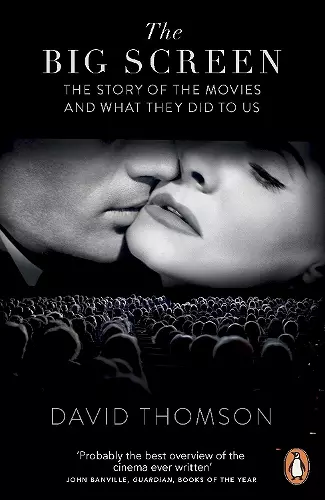The Big Screen
The Story of the Movies and What They Did to Us
Format:Paperback
Publisher:Penguin Books Ltd
Published:3rd Oct '13
Should be back in stock very soon

Taking us around the globe, through time and across multiple media, this book tracks the ways in which we were initially enchanted by this mesmerizing imitation of life and let movies - the stories, the stars, the look - show us how to live.
In this triumphant work David Thomson, one of film's greatest living experts and author of The New Biographical Dictionary of Film, tells the enthralling story of the movies and how they have shaped us.
Sunday Times, New Statesman, The Times, Guardian, Observer and Independent BOOKS OF THE YEAR
Taking us around the globe, through time and across multiple media, Thomson tracks the ways in which we were initially enchanted by this mesmerizing imitation of life and let movies - the stories, the stars, the look - show us how to live. But at the same time he shows us how movies, offering a seductive escape from the everyday reality and its responsibilities, have made it possible for us to evade life altogether. The entranced audience has become a model for powerless citizens trying to pursue happiness by sitting quietly in a dark room. Does the big screen take us out into the world, or merely mesmerize us? That is Thomson's question in this great adventure of a book. A passionate feat of storytelling that is vital to anyone trying to make sense of the age of screens - the age that, more than ever, we are living in.
Probably the best overview of the cinema ever written. It sparkles with insight, is packed with anecdote, and pulses with passion ... a glorious celebration of one of humankind's great inventions -- John Banville * Guardian BOOKS OF THE YEAR *
A devilish, dazzling, out-there divination ... Criticism is rarely this passionate and brilliant. You come away wanting to watch it all * Empire *
David Thomson is a giant in the world of film criticism, and his book is the chest-crusher you might expect: erudite, delightfully tangential and surprisingly polemical -- Kate Muir * The Times *
Thomson has composed a grand aesthetic, spiritual, and moral account of cinema history assembled around the movies and artists that have meant the most to him. As Thomson reconstructs film history, movies bring us close to reality and deliver us into ecstatic dreams. A pungently written, brilliant book -- David Denby (author of SNARK)
The theme of The Big Screen is the weirdness of desire ... Drawing on his vast stock of knowledge, Thomson takes us on a meander through Nouvelle Vague and Italian neorealism; Coppola and Scorsese; MGM musicals and film noir. He always comes back in the end to the kind of fun it is possible to have only at the movies, sitting in the dark, staring at the light ... Line by line, Thomson is still the greatest biographical writer about film of all time ... to read him on his favourite films is to be sent back with renewed yearning to that land of Californian light and loveliness * Sunday Times *
Subtle, erudite and entertaining * Economist *
Fascinating ... a loose-limbed, conversational narrative, moving fitfully through time, dawdling over directors and films that interest ... crackling with ideas and vivid impressionisms ... Thomson's stylish prose, simultaneously erudite and entertaining, captivates as it informs ... Buffs and casual fans alike will enjoy this extra-large serving of popcorn for thought * Publishers Weekly *
The greatest living writer on the movies ... The Big Screen is surely his magnum opus -- John Banville * New Statesman BOOKS OF THE YEAR *
Rigorous and rewarding, and a page rarely passes without insight * Independent BOOKS OF THE YEAR *
Nobody else would match its sweep, its erudition, its discernment or its warmth -- David Hare * Guardian BOOKS OF THE YEAR *
ISBN: 9780141047126
Dimensions: 197mm x 129mm x 27mm
Weight: 421g
624 pages